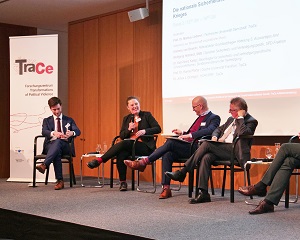With the event “Ein neuer alter Krieg? Der russische Überfall auf die Ukraine und die Transformation politischer Gewalt” (A New Old War? The Russian Invasion of Ukraine and the Transformation of Political Violence), TraCe introduced itself as a new actor of peace research in political Berlin and promoted the exchange between research and politics. Representatives from politics, academia and civil society attended the event at the Hessian State Representation.
Dr Jens Brandenburg, Parliamentary State Secretary to the Federal Minister of Education and Research, welcomed participants to the event and emphasized the relevance of violence research and science-based policy advice. Especially an active knowledge transfer is important for the exchange with the public. Afterwards, Angela Dorn, Hessian Minister of Higher Education, Research, Science and the Arts, praised TraCe in her digital greeting as “flagship for conflict research in Hesse”.
On the first panel, moderated by TraCe spokesperson Prof. Dr. Christopher Daase, Prof. Dr Herfried Münkler, Prof. Dr Monika Wingender, Prof. Dr Thorsten Bonacker and Prof. Dr. Thilo Marauhn discussed whether the Russian invasion of Ukraine disproved the theory of interstate war as a discontinued model and ushered in a new phase of violent conflict. Prof. Dr Herfried Münkler emphasized in his statement that one or two wars do not falsify trends, “which are based on a much larger number of intra-societal wars. But it is true that the Russian war of aggression against Ukraine is currently drawing our attention and forcing significant political reorientations.” [Translation of TraCe, original quote in German version]
TraCe member Prof. Dr Monika Wingender added a language-political dimension: “The language issue in Ukraine has been politicized in election campaigns since the collapse of the Soviet Union. Russia's propaganda abuses this politicization to construct a Ukrainian-Russian language conflict in Ukraine as a justification for war. Research on Eastern Europe must work even more intensively on concepts for knowledge transfer to the public, and politics must listen to research on Eastern Europe more than it has in the past.” [Translation of TraCe, original quote in German version] Prof. Dr Thorsten Bonacker added that Ukrainian voices must be heard more in the debate.
After a short lunch break, the second panel, moderated by Prof. Dr Markus Lederer, focused on the new German National Security Strategy. The participants Prof. Dr. Hanna Pfeifer, Dr. Jonas J. Driedger as well as Wolfgang Hellmich (Member of the German Bundestag), Dr Karl-Heinz Kamp (Federal Ministry of Defense) and Andreas von Brandt (Federal Foreign Office) discussed to what extent topics beyond military security can assert themselves in the National Security Strategy and what role cooperative peace plays in view of the ongoing war.
Although the National Security Strategy will not be published until next year, von Brandt stressed that it focuses on the principle of integrated security, emphasizing the “broad interconnectedness of different problem areas, such as energy, cyberspace or the climate crisis, in order to analyze them together and rethink them from the perspective of security and continued international crisis engagement.” [Translation of TraCe, original quote in German version]
Dr Karl-Heinz Kamp added that the national security strategy is a framework document “under the umbrella of which various more concrete detailed strategies are being worked out, for example, for dealing with Russia.” [Translation of TraCe, original quote in German version]
As a long-standing member of Bundestag's Defense Committee, Wolfgang Hellmich spoke about the fundamentally changed debate situation since February 24. As a parliamentarian, he said, it was his job not only to discuss internal security issues, but to inform the wider society “and to describe the situation in all its complexity. Because at the end of the day, people and their consent are also needed.” [Translation of TraCe, original quote in German version]
Prof. Dr. Hanna Pfeifer picked up Hellmich's argument. She emphasized the importance of citizen participation. Dialog forums show that although citizens simplify global conflicts in the process through everyday references, they also think about major issues such as energy security and climate change.
Dr. Jonas J. Driedger referred to the Russian regime's increasing willingness to take risks, which on the one hand is connected to the endurance of the Russian regime and on the other hand distinguishes this war from past Russian interventions.
A recording of the event will be available on the TraCe YouTube channel in the near future.
To the press release [in German]
To the event program [in German]
More information and photos can be found on the website of the research centre TraCe.
